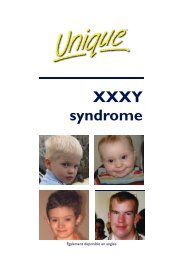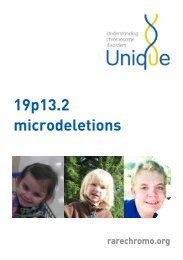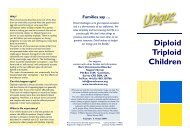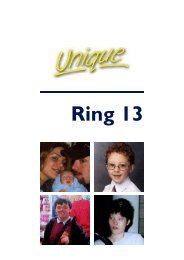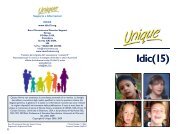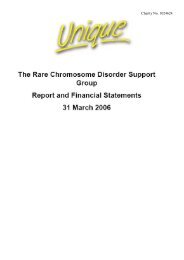16p13.11 microduplications - Unique - The Rare Chromosome ...
16p13.11 microduplications - Unique - The Rare Chromosome ...
16p13.11 microduplications - Unique - The Rare Chromosome ...
You also want an ePaper? Increase the reach of your titles
YUMPU automatically turns print PDFs into web optimized ePapers that Google loves.
Are there people with a <strong>16p13.11</strong> microduplication who<br />
have developed normally and have no speech, learning<br />
or health difficulties?<br />
Yes, there are. <strong>The</strong> <strong>16p13.11</strong> microduplication can be silent. Some parents of children<br />
with a <strong>16p13.11</strong> microduplication have the same microduplication but do not have any<br />
obvious unusual features or delayed development (Hannes 2009; <strong>Unique</strong>).<br />
<strong>The</strong> effect on development, health and behaviour of some genetic disorders ranges from<br />
being barely perceptible to being obvious and severe. In this sense they are like infections<br />
such as flu that can be mild or serious.<br />
If one person in a family with the <strong>16p13.11</strong><br />
microduplication is mildly affected, will others in the<br />
same family also be mildly affected?<br />
Not necessarily. <strong>The</strong>re is a lot of variation between different members of the same family<br />
who have the same microduplication. We know that if one person is mildly affected or<br />
unaffected, others may be more severely and obviously affected.<br />
What is the outlook?<br />
We can’t be sure yet but there appears to be no reason why people who are healthy<br />
should not enjoy a normal lifespan. Several adults have been described in medical<br />
literature and <strong>Unique</strong> has two adult members (see page 7). However, 13 adults with a<br />
<strong>16p13.11</strong> microduplication have developed an adult-onset cardiovascular disorder (Kuang<br />
2011; see page 8).<br />
Pregnancy<br />
Most mothers carrying babies with a <strong>16p13.11</strong> microduplication experienced no<br />
pregnancy problems, had a normal delivery and only discovered their baby was affected<br />
after the birth. <strong>The</strong>re is information available on five pregnancies of mothers carrying a<br />
baby with a <strong>16p13.11</strong> microduplication. Three had no pregnancy problems and no unusual<br />
findings on ultrasound scans. One baby had microcephaly (a small head) on a<br />
20-week ultrasound scan. One mother had a low amount of alphafetoprotein (AFP) in a<br />
maternal screening test while pregnant. This test can indicate the presence of a<br />
chromosome disorder; however, the mother chose not to have an amniocentesis (Hannes<br />
2009; <strong>Unique</strong>).<br />
Feeding and growth<br />
Feeding difficulties do not appear to be common. However, two <strong>Unique</strong> babies were very<br />
picky eaters; one is still fussy at aged five years. He regularly sees a dietician.<br />
One child in medical literature has ‘failure to thrive’. This is a term used to describe a<br />
baby who has poor weight gain and physical growth failure over a period of time. One<br />
child has suffered from constipation from birth (Hannes 2009; Ramalingam 2011;<br />
<strong>Unique</strong>).<br />
Three children are described as small and thin and one is described as tall (Nagamani<br />
2010; <strong>Unique</strong>).<br />
He was breastfed until 11 months old. He gagged on solids as a baby and even today<br />
he gags on some solid foods – 5 years<br />
4



